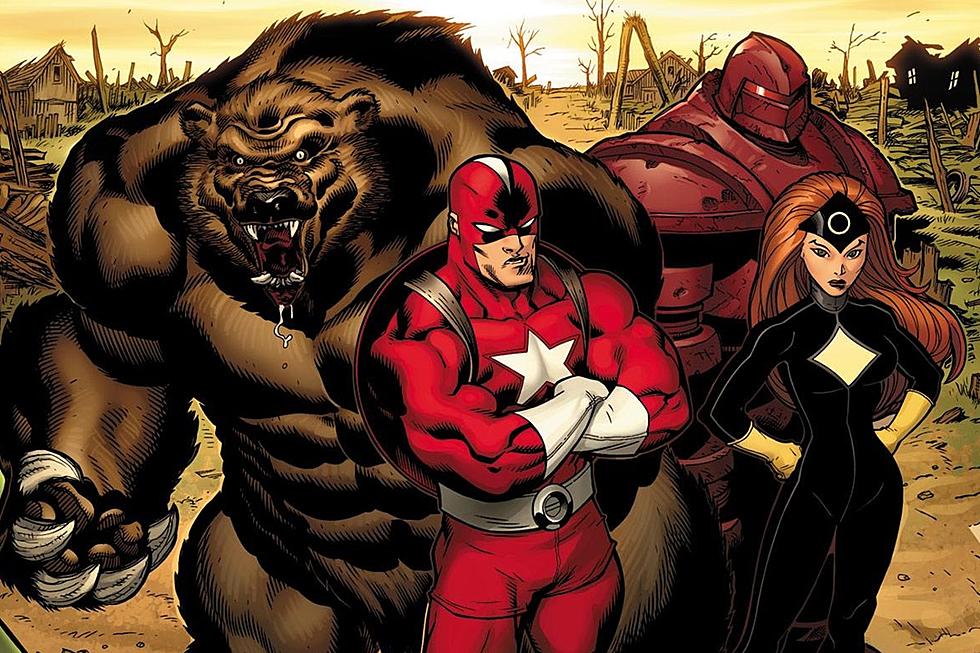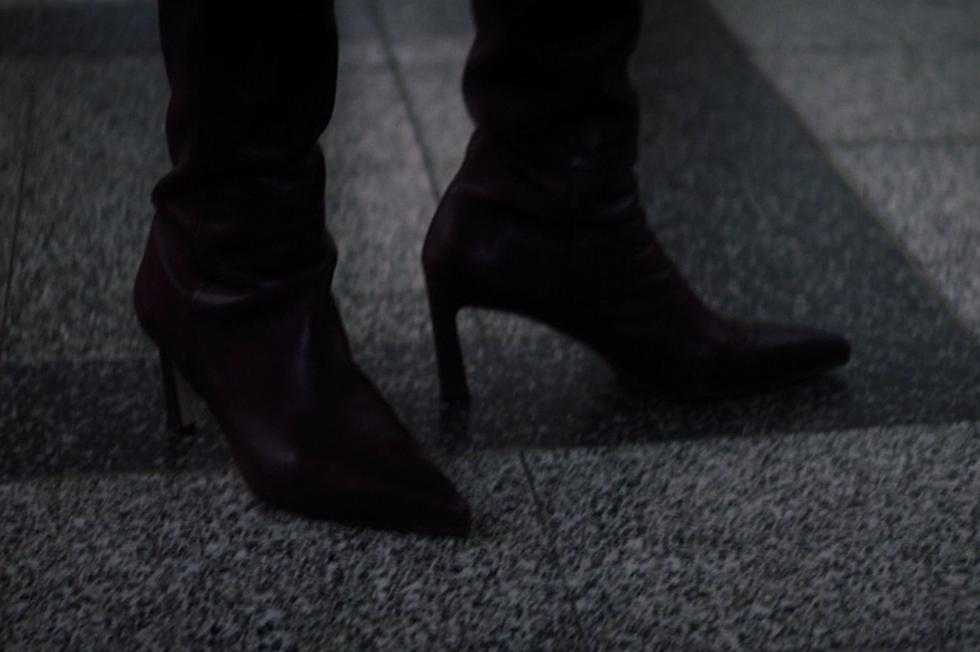
A Cult Of Violence: Comics, Propaganda, And The Information War, Part I
As Russia and America circle each other in this rapidly evolving Cold War 2.0, combat is waged in multiple theaters: cyber war, spy war, proxy war, cultural war, and an information war fueled by a persistent flow of disinformation and propaganda that hijacks narratives and distorts reality. In this series of articles, John Parker examines the common spaces in the strange Venn diagram where propaganda, culture wars, and information wars intersect with the world of comic books.
In January, the Moscow Mayor's Office published "Migrant's Rules of Conduct in Moscow," a 100-page comic book aimed at educating migrant workers from the Caucasus on Russian social norms and laws. Using the "three warriors" characters from Russian folklore, the brochure provides helpful information about the city and basic safety, encourages compliance with its laws, and reinforces the need to learn Russian and always speak it in public.
The language requirement is just one of many prerequisites to obtain a work permit; immigrants must pass a Russian language exam, buy health insurance, carry their documents at all times, and undergo several medical tests, or else face stiff fines of 10,000 roubles --- approximately one-third of the average migrant worker's monthly pay.
Although a complete translation is not yet available, the comic reportedly prohibits eating on the streets, discourages speaking loudly in public, and tells immigrants not to look at Russian women too long. And remember, "even an unfastened seatbelt could be a reason for an entry ban."
The xenophobic undertones have not gone unnoticed. In an interview with the BBC Russian Service, Yevgeny Varshaver of the Russian Presidential Academy of National Economy and Public Administration warned, "The old conflict between Russian heroes and hordes [of non-Slavic invaders] is being revived" in the way information is presented in the comic.
In a country that's witnessed violent clashes between ethnic Russian nationalists and immigrants over the last few years, it's a valid concern. Xenophobia is commonplace in Russia, and the exact behaviors that the comic prohibits sound a lot like the complaints made about immigrants by extreme nationalists; they don't speak our language, they talk too loud, they look at our women.
Part of me doesn't want to cast the creators as racist, because they might not be. When you're a government employee in Russia and the dictum is to promote ethnic and cultural dominance and encourage servility, this is probably what you do. And whatever the intention of the comic, I don't think that every Russian believes that immigrants should keep their eyes on the ground and speak only when spoken to.
That part of me is even willing to concede that the comic could result in fewer racially motivated confrontations, a problem that will likely get worse when right-wing extremists return home from fighting in eastern Ukraine. But if that were truly the intent, a much better comic would say something like, "Don't Assault People Because They're Foreigners."
And that's just what one part of me thinks. The rest of me is enraged. In general. Most of the time, now.
National populism and xenophobia are trending upward all over the world. In the US, Jewish community centers are receiving bomb threats, and cemeteries are being vandalized; an Indian man was shot dead only a few miles from my home because he was mistaken for an Iranian by a drunken racist idiot; after the election, hate crimes skyrocketed. Unfortunately, I believe it's only going to get worse.
At this moment, all I can perceive of this comic is that it, like this worldwide movement, is malign. It's just one more artifact of this era of isolationism and misinformation, an era that is only beginning, and has yet to reach maximum velocity. It's another shot fired in a culture war that most Americans didn't even realize was being waged, with propaganda and disinformation coming at us from all sides.
Years before the term "fake news" was tossed at any story that didn't fit with our worldviews, the Kremlin was financing a "troll factory" that spread propagandized information through social media around the clock, once convincing Louisiana residents that ISIS had destroyed a fictional chemical plant on the anniversary of 9/11. Twitter bots have been weaponized to sow chaos. Demonstrably false stories that originate in Russia or nearby countries routinely infect Western conspiracy and alternative media sites that cater to both the American Left and Right, furthering the confusion of an already fragmented and imperfect media.
Mysterious think tanks like the Center for Eurasian Strategic Intelligence (CESI) produce reports that make their way to Western mainstream media and then disappear in a cloud of smoke. Once exposed, they're replaced with something ridiculous; CESI has now turned its vast intellectual and analytical powers to the subject of the best vibrators to use on your feet.
The more you look into this stuff, the odder and more disorienting it gets. It's like a house of mirrors. It tests your trust, your foothold on reality, your paranoia, your research skills, and your stamina for absurdity. And this is just the way it is now.
Disinformation isn't entirely unavoidable yet, but Russian propaganda is all over the internet, and it's only one producer of many in the vast reaches of the web. One step in the wrong direction --- like the Twitter account of Donald Trump --- and you're drowning in falsehoods, misconceptions, and agendas, and it's by no means exclusive to one half of the political spectrum. And somehow, this is all just the new normal. This is the way it is now. A world where we all suddenly know what "active measures" are, what kompromat means.
Welcome to post-truth, fake news, alternative facts, and the dizzying effect of propaganda. Welcome to the spy war, information war, Cold War 2.0, or whatever you want to call these uneasy feelings in our stomachs, this uncertainty beneath our feet. Where America is now a "flawed democracy" at war with itself. It always was, but it feels much more official now.
What does any of that have to do with comics? More than you might think.
Comics are an excellent vehicle for propaganda. They've been noted for their effectiveness in the classroom by several educators, decades after Will Eisner recognized the very same when he produced "Joe Dope" instructional comics for Army Motors. I'm not a cognitive scientist, but it seems that in combining text and images, comics stimulate more of the brain than just text --- they require object recognition, comprehension of visual narrative, and the visual word form area.
By virtue of being a great teaching tool, comics are also a fantastic lying tool, and the medium is an ideal delivery system for propagandistic ideas. That's a capability that's multiplied by a thousand once you throw in superheroes, modern myths, and the Good perpetually defeating the Bad. American comics famously took advantage of these properties during and just after World War II.
American superhero and combat comics inculcated a sense of patriotic pride and global interventionism among a generation that was preceded by staunch isolationists. With bright colors and black-and-white morals, comics distorted and simplified fundamental truths about the enemy to influence the hearts and minds of every American that passed a newsstand.
Comics remain a capable delivery system for a certain kind of propaganda in form and imagery, but Western superheroes are far beyond the days of rabid jingoism. American propaganda comics are never spoken of without notes of embarrassment, and admissions of the crudeness and racism we thought we left behind us. An apologetic shrug; "Well, it was war."
It's unlikely that we'll ever see an upswell in propaganda comics in America again, but if you follow the news coming from the other side of the world, it seems as though Putin's Russia considers whatever conflicts with the official narrative or their "traditional values" to be propaganda. While their think tanks and trolls take advantage of the openness of Western media to fill the internet to burst with the stuff, Russia's courts label speech and art as "propaganda" just so they can censor it.
In many notable occasions, including comics, they're wrong. Usually, whenever a Putinist calls something "propaganda," you can almost be assured it's not. Like the "fake news" label, when the term "propaganda" is employed by certain people, it just becomes a confirmation of the opposite. A lie that reveals the truth.
Which is interesting, because most of the time, real propaganda is the inverse. The hallmark of truly great propaganda is that it begins with a kernel of truth. Usually, to tell you a lie.
We'll explore the use of comics as propaganda further as we continue this series. In the next installment: Maus, Overwatch, and the "cult of violence" of The Avengers.
More From ComicsAlliance









